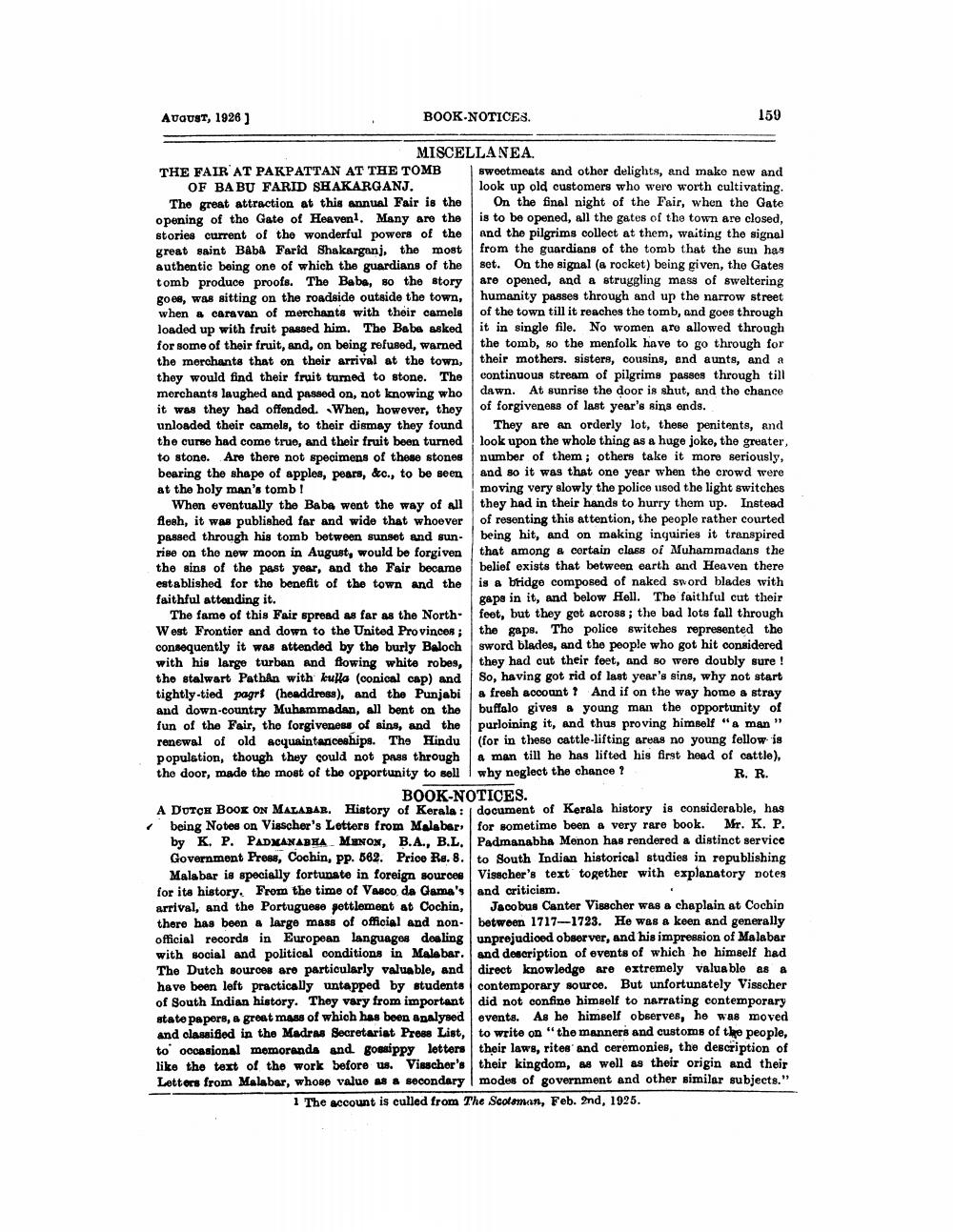________________
AUGUST, 1926 )
BOOK-NOTICES.
159
MISCELLANEA. THE FAIR AT PAKPATTAN AT THE TOMB
sweetmeats and other delights, and make new and OF BABU FARID SHAKARGANJ.
look up old customers who were worth cultivating. The great attraction at this annual Fair is the On the final night of the Fair, when the Gate opening of the Gate of Heavenl. Many are the is to be opened, all the gates of the town are closed, stories current of the wonderful powers of the and the pilgrims collect at them, waiting the signal great saint BABA Farid Shakarganj, the most from the guardians of the tomb that the sun has authentic being one of which the guardians of the set. On the signal (a rocket) being given, the Gates tomb produce proofs. The Baba, so the story are opened, and a struggling mass of sweltering goes, was sitting on the roadside outside the town, humanity passes through and up the narrow street when & caravan of merchants with their camels of the town till it reaches the tomb, and goes through loaded up with fruit passed him. The Babe asked it in single file. No women are allowed through for some of their fruit, and, on being refused, warned the tomb, so the menfolk have to go through for the merchants that on their arrival at the town, their mothers. sisters, cousins, end aunts, and a they would find their fruit tumed to stone. The continuous stream of pilgrims passes through till merchants laughed and passed on, not knowing who dawn. At sunrise the door is shut, and the chance it was they had offended. When, however, they of forgiveness of last year's sins ends. unloaded their camels, to their dismay they found They are an orderly lot, these penitents, and the curse had come true, and their fruit been turned look upon the whole thing as a huge joke, the greater, to stone. Are there not specimens of these stones number of them; others take it more seriously, bearing the shape of apples, pears, &c., to be seen and so it was that one year when the crowd were at the holy man's tomb !
moving very slowly the police used the light switches When eventually the Baba went the way of all they had in their hands to hurry them up. Instead flesh, it was published far and wide that whoever of resenting this attention, the people rather courted passed through his tomb between sunset and sun. being hit, and on making inquiries it transpired rise on the new moon in August, would be forgiven that among a cortain class of Muhammadans the the sins of the past year, and the Fair became belief exists that between earth and Heaven there established for the benefit of the town and the is a bridge composed of naked sword blades with faithful attending it.
gapa in it, and below Hell. The faithful cut their The fame of this Fair spread as far as the North- feet, but they get across; the bad lots fall through West Frontier and down to the United Provinces : the gaps. Tho police switches represented the consequently it was attended by the burly Baloch sword blades, and the people who got hit considered with his large turban and flowing white robes, they had cut their feet, and so were doubly sure ! the stalwart Pathan with kulla (conical cap) and So, having got rid of last year's sins, why not start tightly-tied pagr (headdress), and the Punjabi a fresh account? And if on the way home a stray and down-country Muhammadan, all bent on the buffalo gives a young man the opportunity of fun of the Fair, the forgiveness of sins, and the purloining it, and thus proving himself "a man" renewal of old aoquaintanceships. The Hindu (for in these cattle-lifting areas no young fellow is population, though they could not pass through a man till he has lifted his first head of cattle), the door, made the most of the opportunity to sell I why neglect the chance ?
R. R. BOOK-NOTICES. A DUTCH BOOK ON MALABAR. History of Kerala : document of Kerala history is considerable, has
being Notes on Visscher's Letters from Malaber, for sometime been a very rare book. Mr. K. P. by K. P. PADMANABHA MENON, B.A., B.L. Padmanabha Menon has rendered a distinct service Government Press, Cochin, pp. 562. Price Rs. 8. to South Indian historical studies in republishing
Malabar is specially fortunate in foreign sources Visscher's text together with explanatory potes for its history. From the time of Vasco da Gama's and criticism. arrival, and the Portuguese pottlement at Cochin, Jacobus Canter Visscher was a chaplain at Cochin there has been a large mass of official and non-between 1717-1723. He was a keen and generally official records in European languages dealing unprejudioed observer, and his impression of Malabar with social and political conditions in Malabar. and description of events of which he himself had The Dutch sources are particularly valuable, and direct knowledge are extremely valuable as a have been left practically untapped by students contemporary source. But unfortunately Visscher of South Indian history. They vary from important did not confine himself to narrating contemporary stato papers, a great mass of which has been analysed events. As he himself observes, he was moved and classified in the Madras Secretariat Proes List, to write on "the manners and customs of the people, to occasional memorands and gossippy letters their laws, rites' and ceremonies, the description of like the text of the work before us. Visscher's their kingdom, as well as their origin and their Letters from Malabar, whose value as a secondary modes of government and other similar subjects."
1 The account is culled from The Scotsman, Feb. 2nd, 1925.




